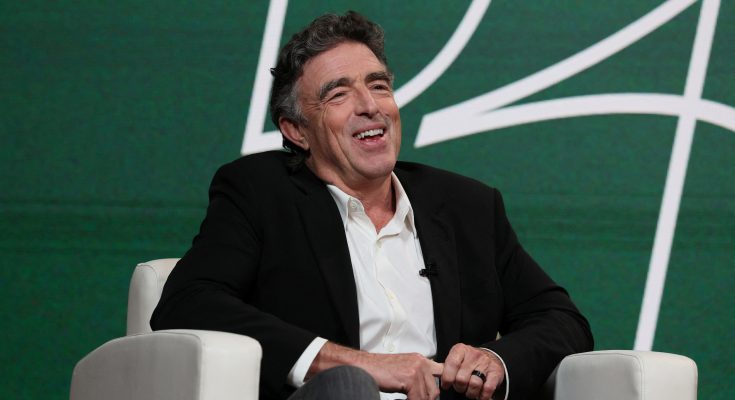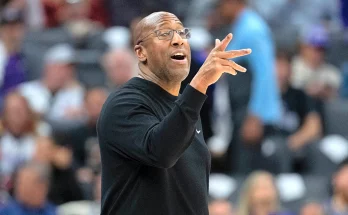The landscape of professional basketball in Boston is on the cusp of a historic transformation as Wyc Grousbeck, long recognized as the face of the Boston Celtics’ ownership group, prepares to step aside as team governor following the completion of a monumental ownership sale. Grousbeck, who has been integral to the Celtics’ revival over the past two decades, has guided the franchise through periods of dramatic change, championship contention, and organizational evolution, leaving an indelible mark on both the team and the broader NBA community. The transition represents not only the end of an era but also a pivotal moment in the franchise’s history, as new leadership assumes control and charts a path forward in one of the league’s most storied organizations.
Since acquiring the Celtics in 2002 alongside a group of investors, Wyc Grousbeck has been instrumental in transforming the team into a consistent contender. Under his stewardship, the Celtics returned to prominence, capturing the 2008 NBA championship and securing multiple playoff appearances in subsequent seasons. Grousbeck’s approach to ownership has often been characterized by a willingness to blend business acumen with a deep appreciation for basketball culture, balancing the demands of a high-profile sports franchise with the need to maintain strong relationships with players, coaches, and the fanbase. His leadership extended beyond the court, influencing team operations, player acquisitions, and community engagement, and his departure as governor signifies a major shift in the Celtics’ organizational structure.
The sale of the Celtics, reportedly to a consortium led by Bill Chisholm, marks one of the most significant transactions in NBA history. The deal reflects the increasing valuation of professional sports franchises in the modern era, driven by robust media rights deals, sponsorship opportunities, and a global fanbase hungry for premier basketball content. Grousbeck’s decision to step down as governor coincides with this transaction, signaling both a recognition of the franchise’s growth and the arrival of a new era under fresh leadership. While he will no longer hold the official title of governor, Grousbeck is expected to maintain a role as a guiding figure in the organization, providing continuity during the transitional period and offering insights from his extensive experience in team management and operations.
For fans and analysts alike, the news raises questions about the Celtics’ future direction. Under Grousbeck’s tenure, the team has cultivated a reputation for strategic decision-making, both on the business side and in basketball operations. His influence has shaped pivotal moments in the team’s history, from drafting key players to orchestrating trades that positioned the Celtics as perennial contenders. With a new leadership team at the helm, the organization faces both opportunities and challenges, including maintaining its competitive edge, nurturing young talent, and preserving the cultural identity that has defined the Celtics for decades. The transition also underscores the evolving nature of professional sports ownership, where generational shifts among leadership can impact everything from management philosophy to the franchise’s approach to branding and fan engagement.
Grousbeck’s departure as governor comes at a time when the Celtics remain a formidable presence in the NBA. The team continues to feature superstar talent and a coaching staff capable of competing at the highest level, positioning the franchise for continued success on the court. However, ownership transitions invariably bring scrutiny and speculation, as stakeholders assess the new leadership’s vision and priorities. The Chisholm-led consortium, which reportedly includes investors with backgrounds in finance, technology, and sports management, will need to balance the franchise’s historical legacy with the demands of modern professional sports, leveraging new revenue streams while sustaining competitive excellence.
The impact of Grousbeck’s tenure extends beyond the hardwood. His commitment to community initiatives and philanthropic efforts has helped solidify the Celtics’ reputation as an organization that values social responsibility and engagement with local communities. Programs supporting youth development, education, and social equity have flourished under his leadership, reinforcing the team’s connection to Boston and its surrounding areas. As new leadership takes the reins, maintaining these programs and ensuring that the Celtics remain a positive force in the community will be an important measure of success. Grousbeck’s legacy, therefore, is defined not only by wins and losses but by the broader influence he has had on the culture and values of the franchise.
Historically, transitions of this magnitude have been critical junctures for NBA teams. Ownership changes can reshape organizational priorities, influence player transactions, and alter the strategic direction of the franchise. In the case of the Celtics, Grousbeck’s exit as governor is particularly significant given his nearly 25-year tenure and the transformative impact he has had on the team’s identity. Observers anticipate that the new leadership will seek to honor the legacy of success established under Grousbeck while introducing innovative strategies to expand the franchise’s reach, increase revenue, and maintain a competitive roster capable of contending for championships.
The timing of this transition is also notable in the context of broader trends in the NBA. Franchise valuations have skyrocketed over the past decade, driven by lucrative media contracts, global expansion, and the emergence of new markets for professional basketball. As such, the sale of the Celtics represents not only a business transaction but a strategic investment in one of the league’s most valuable and historically significant franchises. The Chisholm-led group inherits a team with a strong foundation, recognizable brand, and loyal fanbase, but with that comes the responsibility of sustaining success both on and off the court. Grousbeck’s continued involvement, albeit in a less formal capacity, may help bridge the gap between past achievements and future ambitions, providing institutional knowledge and guidance during the transitional phase.
Fans of the Celtics have responded to the news with a mix of nostalgia and anticipation. Many recall the transformative moments of the Grousbeck era, from the drafting of star players to the team’s return to championship contention in 2008. Others look forward to the opportunities that new leadership might bring, including innovative approaches to team management, expanded engagement with fans, and potential investments in player development and analytics. While the departure of a longtime governor is always bittersweet, it also opens the door to new possibilities and creative directions that could further elevate the franchise in an increasingly competitive league.
From an organizational perspective, the transition represents an opportunity to modernize operations while maintaining continuity. Leadership changes at the ownership level often ripple through front offices, coaching staffs, and business departments, requiring careful management to ensure a smooth handover. The Celtics’ management team, led by executives with experience in professional sports and finance, will play a key role in executing the vision of the new owners while preserving the franchise’s storied tradition. Grousbeck’s decision to step aside may also signal a deliberate strategy to empower the next generation of leadership, positioning the Celtics for sustained success in an evolving NBA landscape.
In reflecting on Grousbeck’s tenure, it becomes clear that his influence on the Celtics transcends the tangible metrics of wins, championships, and financial growth. His leadership has helped shape the culture of the organization, fostering an environment where competitive excellence, innovation, and community engagement are intertwined. The transition of governance, while momentous, is also a testament to the strong foundation he has built—a foundation that the new owners can build upon to further elevate the franchise. The Celtics enter this next chapter with both the weight of history and the promise of new opportunity, a combination that has the potential to define the trajectory of the team for years to come.
As the sale is finalized and Grousbeck officially steps down as governor, the Celtics organization faces a moment of reckoning and renewal. The departure of a figure so deeply embedded in the team’s identity is always a significant event, but it also serves as a reminder of the cyclical nature of professional sports, where leadership evolves alongside talent, market dynamics, and fan expectations. With new ownership in place, the Boston Celtics are poised to navigate this transition with a blend of respect for the past and ambition for the future, leveraging the legacy of Wyc Grousbeck while embracing the opportunities that lie ahead in one of the NBA’s most competitive and storied markets.
In conclusion, Wyc Grousbeck’s decision to step aside as Boston Celtics governor following the team’s historic sale marks the end of a significant era in professional basketball. His tenure has been characterized by strategic vision, community engagement, and a commitment to excellence, leaving an enduring impact on the franchise. As the Chisholm-led consortium assumes control, the Celtics are entering a new phase, balancing the preservation of tradition with the pursuit of future growth. While the departure of a longtime governor inevitably brings a period of adjustment, the strong foundation established under Grousbeck’s leadership ensures that the franchise remains well-positioned for continued success. The Celtics’ journey into this next chapter will be watched closely by fans, analysts, and the broader NBA community, as the organization seeks to honor its storied past while forging a path toward an ambitious and dynamic future.


